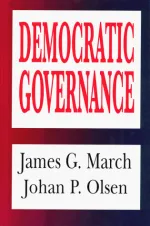In this thought-provoking new work, long-term collaborators James March and Johan Olsen construct a brilliant foundation for thinking about the broad theoretical concerns of democratic governance. Building on the work that began with their seminal essay on “The New Institutionalism” in The American Political Science Review in 1984 and continued in “Rediscovering Institutions”, March and Olsen challenge key aspects of standard contemporary thinking. While conventional thought is based primarily on the premises of individualism and self-interest, the authors argue that exchange theories of democracy are incomplete, reflecting only a partial view of history and human action. Going beyond democratic theory, March and Olsen draw on social science to examine how political institutions create and sustain democratic solidarity, identities, capabilities, accounts, and adaptiveness; how they can maintain and elaborate democratic values and beliefs — and how governance might be made honorable, just, and effective. They show how democratic governance is both proactive and reactive — creating interests and power as well as responding to them — and how it shapes not only an understanding of the past and an ability to learn from it, but even history itself. By exploring how governance transcends the creation of coalitions that reflect existing preferences, resources, rights, and rules, the authors reveal how it includes the actual formation of these defining principles of social and political life. Which institutions serve democracy best? March and Olsen do not offer neat answers. Instead, while recognizing the complications involved in fulfilling democratic ideals, they ask how individuals and societies can achieve institutions that can make politics civil, accountable, capable, and transformative. In what is likely to be received as a seminal work, March and Olsen have established a comprehensive framework for discussion and debate that will continue to be read in management, political science, education, psychology, and sociology into the 21st century.
